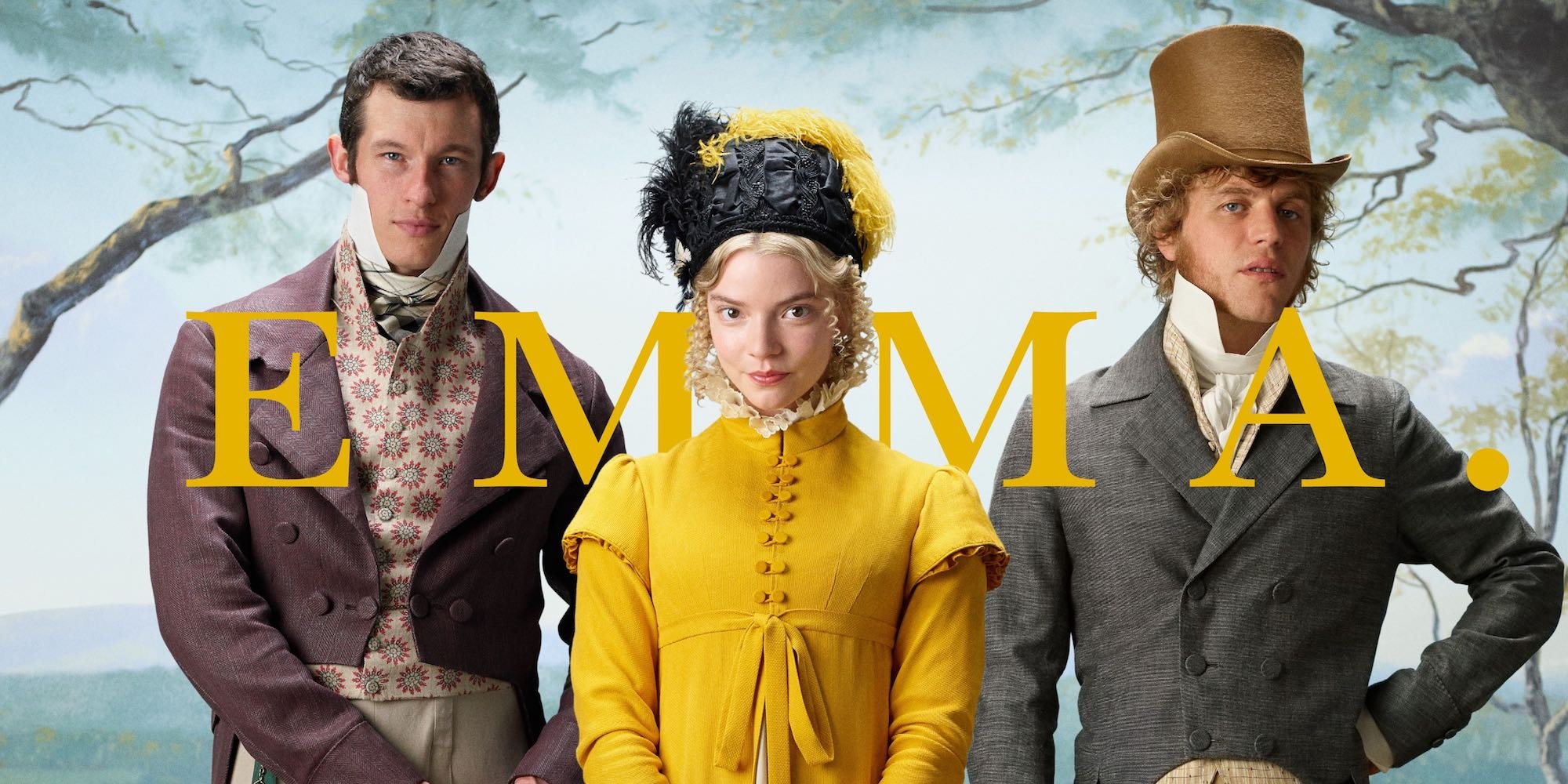
My husband and I recently rented the latest film version of Jane Austen’s Emma, out this Spring and now streaming at home. I’m solidly in Generation X, and so I can’t think of Jane Austen’s Emma without conjuring up Alicia Silverstone as Cher in Clueless (“as if!”). I passed on the 1996 version with Gwyneth Paltrow. That was before Gwyneth was insufferable, so I don’t know how I missed it. In any event, I was looking forward to this new version of the Jane Austen period comedy.
First of all, this movie is a delight. I don’t subscribe to People magazine, so let me just say that the washed-up rocker guy from Love Actually is perfect in the role as Emma’s dad. The sets and the costumes are a visual treat for someone who’s been staring at the same four walls for … a while. The church scenes remind me so much of our time at Bruton Parish Church in Williamsburg, Virginia. And the soundtrack! John Rutter?! A shape-note-esque version of “How Firm a Foundation”! I was transported.
Jane Austen brings us so much more Gospel, though, than what could be fit into empire waist dresses and a gorgeous film. Emma Woodhouse reminds us of the great truth that my great-grandmother summed up as, “There’s no trouble like the trouble you make yourself.” Emma means well, which is another way of saying that she messes up. Bored in only the way that people born into privilege can be bored, she stirs the pot. Her pot-stirring causes some real-life consequences for people she loves, and she hurts people. Does this sound familiar? If it doesn’t, live a while. It will.

If you’re not quite sure you’ve been in Emma’s (designer, adorable, expensive) shoes, then maybe you know someone who has. And if the English countryside Emma doesn’t speak to you, go re-watch Alicia Silverstone’s face when she realizes how disgusted she is with herself for her own behavior. She means well. But it backfires. Most of us have at least had that experience, where we’re not maliciously sabotaging our relationships, but we realize that we’ve put our foot directly into our mouth, or we’ve let our own biases seep out when it’s uncomfortable or even painful for others.
Emma, in the 2020 film version of Emma, surprises us with a keen self-awareness for her age and position. To make nice with the parties she’s harmed, she shows up with baskets of vegetables and, on one occasion, a dead goose. She apologizes with sincerity. Would that we could all drape a woven basketful of produce and poultry over our arms for such a gesture. Once, when she realizes how badly she’s failed a friend, she breaks out into a spontaneous nosebleed, and then insists on making things right herself.
If you’ve never felt stuck in circumstances where the same dreadful humans show up in your life over and over again, even when they’re dull or self-absorbed or — heaven forfend — interested in someone who is beneath their station … well, then maybe you should stay away from Jane Austen. Or watch it to remind yourself of another Emma-esque blabbermouth in your life. But if you’ve ever found yourself needing forgiveness in trouble you’ve made yourself because of those other humans, then Emma’s your gal. If there’s one thing that this year has taught us (other than to wash your hands OMG), it’s that we depend on one another. There’s always going to be trouble we make ourselves, and it usually involves other humans.
In the real world, outside of Jane Austen’s novels, we don’t often get forgiveness and closure with a basketful of freshly dead goose. There can be weeks, months, years, even, when the intervening pain and suffering cause relationships to deteriorate. Reconciliation is usually not simple or tidy. But we can all pray for the self-awareness of Emma, who means well and begs forgiveness for her mistakes. Her reward, in the end, is a love that knows her and loves her because of — and in spite of — herself. This love encompasses not only Emma herself, but her high-maintenance, hypochondriac father. This love knows that she will make trouble like only she can make herself, and this love forgives her and accepts her anyway.
In Jane Austen’s novels, that love looks like the kind of kissy love that Emma’s father shields behind a movable screen. That’s all in good fun and sweetness, and it makes for a good date night. In the Gospel, that Love is Jesus, who knows us, and knows the Trouble We Make Ourselves, and forgives us and our hypochondriac families, too. Thank God for that.

COMMENTS
3 responses to “There’s No Trouble Like the Trouble You Make Yourself”
Leave a Reply













We are got to keep you home more often if your captivity produces more of this outstanding work! Great job, Carrie!
Wonderful piece, Carrie! Little Gram would be so proud that one of her truisms lives on.
You might like https://savedbydesign.wordpress.com/2020/03/09/meaning-what-exactly/